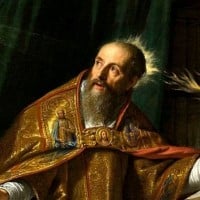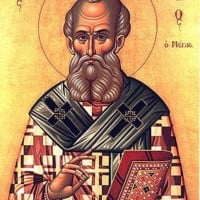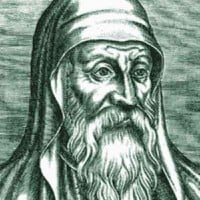Top Ten Most Important Church Fathers
What is a Church Father? You know how America has its Founding Fathers? It is the same ideal. These men led the Early Church and definitely influenced the theology of the Church. They led the way and we stand on their shoulders. Some of them were popular, some were controversial, and some were even deemed heretical. In this list, we will be examining the ten most important Church Fathers. There are a few things which must be acknowledged. Firstly, while I may write my personal opinion, it will not factor into my ranking. Secondly, the time span taken into consideration is post apostolic period (late first century) to the Council of Chalcedon in 451. If you would like to add people post Council of Chalcedon feel free, but try not to pass the Second Council of Nicaea (787). And lastly to define our terms, a Church Father is anyone who had a high degree of scholarship in the Early Church and was deemed orthodox by a substantial amount of fellow Christians, though they may be considered heretical today. There are three eras I'll be referencing. The Apostolic, sub-Apostolic, and the Patristic. The Apostolic era is when the Apostles would have walked the Earth. The sub-Apostolic is the era directly after the Apostolic, in which people who knew the Apostles would be alive. The Patristic era is the sub-Apostolic era to the Council of Chalcedon from which many of my choices will come from. Without further ado, here is the list. Feel free to vote, comment, and remix.
Augustine, the father of amillennialism, a strong defender of election and predestination, and nearly all theologians of any importance, were influenced by his brilliance. While most writers have 1 major work of brilliance, that people would claim as a magnum opus, Augustine has 4. God working through Augustine to defy Pelagius was a monumental victory for preserving and keeping with the truth.
If you were to ask any biblical scholar who they consider to be the most important Church Father, I think the majority would answer Augustine. Augustine was a North African theologian, Christian author, bishop, and preacher that lived from 354 to 430. He wrote extensively and was a very convincing debater. The City of God, Confessions, On Christian Doctrine, and On the Trinity would be his most important works. He was mentored by Ambrose of Milan, another important Church Father. He would end up dying of an illness during a siege of Hippo by the Vandals. He heavily advanced the ideas of original sin and just war. Augustine was heavily influential among his contemporaries and to Christians today. His view of the Trinity closely resembles the Nicaean Creed. Augustine is so influential to us today that both Catholics and Protestants use his teachings, and his ideas are at the core of some. Two notable people Augustine would influence are John Calvin and Martin Luther during the Protestant Reformation. Augustine was a very controversial Father, but most would agree he is by far the most important.

On the incarnation has been the preeminent work for defending the truth of Christ come in the flesh since it was penned. His life was incredibly complex, he knew Augustine and influenced his thinking.
Let's talk Nicaea. Athanasius was perhaps the leader of the Trinitarian movement and a primary speaker at the Council of Nicaea, opposing Arianism. Athanasius of Alexandria was a North African theologian and bishop that lived from 296-298 to 373. He was mentored by Alexander of Alexandria. He would play a huge part in the Council of Nicaea which was a Council discussing the Divinity of Jesus. The result was the council affirming Jesus as true God. Athanasius would fight against Arianism for the rest of his life. Athanasius would be a big supporter of the term Logos and the idea of the Incarnation. Athanasius was also the first to use all 27 books of the New Testament canon that we see today. Athanasius was easily one of the most important of the Church Fathers.
The first man we know of to consider the books of Matthew, Mark, and Luke scripture. Remarkable work against heresies set the groundwork for all future fathers to come after. He was vastly underrated and defended the faith admirably through his brilliant knowledge.
Irenaeus is an extremely important person in the Patristic Age. Some might argue he is the most important. Irenaeus of Lyons was a French (before France existed, so Gaul) bishop and theologian that lived from 130 to 202. He claimed to be taught by Polycarp who claimed to be taught by John the Apostle. Irenaeus would also learn under Justin Martyr. His most famous work was Against Heresies, a scathing rebuke of gnosticism and Marcionism. To Catholics, he provides the historical resource by which the Church of Rome is considered to be preeminent and teaches Apostolic Succession. Protestants counter that line of thought by arguing that Irenaeus was arguing that all orthodox churches could trace back to the Apostolic Church. His most important contribution would be his valuable writings on justification, recapitulation, the Incarnation, and generally his teachings on salvation. He is also one of the first people to use all four of the Gospels and would use many of Paul the Apostle's epistles. He is a very important Church Father.

Origen is another controversial Church Father. Origen of Alexandria was a theologian, apologist, and Christian writer and teacher that lived from 185 to 253. Origen was a very prolific writer and wrote many homilies. He also wrote one of the most famous Christian defenses in Against Celsum. Origen would be incredibly controversial and still is today. According to legend, he self castrated himself and was extremely ascetic. He introduced the ransom view of atonement, a doctrine that would be popular until Anselm of Canterbury strongly opposed it and advanced the satisfaction view. Origen also would popularize the theories in the preexistence of souls and universalism (though he would just claim it to be a theory). He was a big supporter of free will, allegorical interpretation, and pacifism. His biggest controversy would be his subordination view of the Son and Spirit, though Trinitarianism had not been popularized and subordination was a popular belief. He would be denied sainthood and the classification of Church Father by the Catholic Church which, like Tertullian, makes him very polarizing. Origen would end up being tortured to death for his faith.
Tertullian is quite the controversial figure as some would not even consider him a Church Father. Tertullian of Carthage was a North African Christian author, theologian, and apologist that lived from 155 to 220. Tertullian actually started as a lawyer, which would come into play whenever he decided to defend Christianity. He was a great debater and would write many influential pieces of writing. He was also the first Christian to write in Latin. His most important contribution would be his contribution to the early development of the Trinity. Opinion on Tertullian is very divided. Catholics, though recognizing the great work he did, deny him canonization and even the term Church Father because he later became a Montanist, a theology that teaches that we receive new divine revelations. There is no reason to believe he completely subscribed to that belief since he still believed in the absolute authority of Scripture. Catholics also dislike him because of his views of baptism, submission of the Son and Spirit, and his view of Mary. Protestants, on the other hand consider him a Father. He would be one of the very first proponents of the Trinity and wrote a lot on defining Christian doctrine, defended the Faith, and challenged many of the doctrines that define the Catholic Church. Depending on who you ask, they may differ on how important Tertullian was.
Justin Martyr is one of the earliest and most important of the Church Fathers from the Patristic age. Justin Martyr was an apologist, theologian, teacher, and philosopher that lived from 90-100 to 162-168. Justin Martyr's cup of tea was Christian Apologetics. Many of his works are unfortunately lost. His First Apology is his most important and famous work. He wrote the apology to the Emperor in an attempt to stop the persecution going on during his reign. His Dialogue with Trypho was another important apology he wrote. Martyr was also a theologian. He was one of the first to write about the Logos and, with that, he wrote about how all virtue comes from Christ and that means that every person of virtue was a Christian before Christ had come. After Christ however, Christ redeeming blood was necessary and it is possible that Irenaeus got his doctrines of redemption from Justin Martyr. Justin Martyr was, of course martyred, in Rome for his faith along with some of his students.
Clement of Rome is an incredibly important Church Father from the sub-Apostolic age. Clement of Rome is known as the very first Church Father and definitely knew some of the Apostles. Clement of Rome was a bishop and lived from 35 to 99. Catholics claim that Clement was the first pope after Peter the Apostle however Protestants argue there is no reason to believe that the Early Church had a monarchial succession and Clement never claimed that title. Clement would write First Epistle of Clement to Corinth in which he talks about Church organization which gives a glimpse into what the Apostolic and sub-Apostolic Church looked like. Legend has it Clement would die by being tied to an anchor and thrown into the sea. That is about all we know from the life of Clement for certain, but that by itself makes him a very important Church Father.
His epistle is beautifully reading and feels like reading scripture. Humbly and correectly, he apologizes to the Philippans that his epistle would be nothing like Paul's. He stood with Christ through even his death, standing unapologetic for his faith in God almighty until his last breath.
Polycarp was one of the three chief sub-Apostolic Fathers, along with Clement of Rome and Ignatius of Antioch. Polycarp of Smyrna was a bishop and a disciple of John the Apostles that lived from to 69 to 155. Polycarp is important because he, like Clement of Rome, gives us an important indication of what the first century Church looked like, consisting of elders/bishops/presbyters and deacons, in his epistle to the Philippians. Polycarp is most famous for his martyrdom, in which he was burned at the stake and when the fire did not engulf him, stabbed to death. Even though little is known of Polycarp, he was very important.
Translated the bible into the vulgate. Which means it was the common latin vernacular of the time, making the word of God accessible to the common man. Luther disagreed with his wiritngs that were thought to be in support of free will, calling Jerome and Origen "two of the worst men to ever handle to the scriptures" In bondage of the will (Absolute classic, should be read!)
Jerome is a very interesting character in the Patristic age. Jerome of Stridon was a European translator, historian, and theologian that lived from 342-347 to 420. Jerome is most known for translating the Bible into Latin. The translation would be known as the Vulgate. Perhaps he named it the Vulgate because he was very vulgar. That is to say, he wasn't exactly the nicest person and some biblical scholars would say he was just a jerk. Jerome would, coincidentally, write a lot about how to live a moral life. Quite the interesting Church Father, but also very important.
Vastly underrated, the 3rd most quoted theologian by Calvin in the institutes. His works are largely available, and beautifully written. On marriage and family life is a better guide for Christian marriage than the books written today. He lived in a monastary and was devoted to studying and memorizing scripture. Credited as the greatest preacher in Christian history.
John Chrysostom is a very underrated Church Father that fails to get mentioned sometimes. John Chrysostom of Antioch was a Greek preacher and bishop that lived from 347 to 407. He was a remarkable preacher and even Chrysostom literally means "golden mouthed". He was a eloquent speaker and out of all the Greek Fathers he would have the most works surviving to today. Before becoming a preacher, he was so ascetic he almost died. He also wrote many homilies and treatises. He opposed religious corruption and spoke out against many of the sins of the day. John Chrysostom would be a heavy influence to all preachers and is a good one to study. He was an inspiration to many, thus his importance.
Responsible in part for the conversion of Augustine through his preaching that caught the attention of Augustine. Has some impressive works of his own as well.
Subapostle who wrote the most works of the 3. Was taught by John directly, and ministered to the different early churches and has done much to influence Christian thinking through his writings.